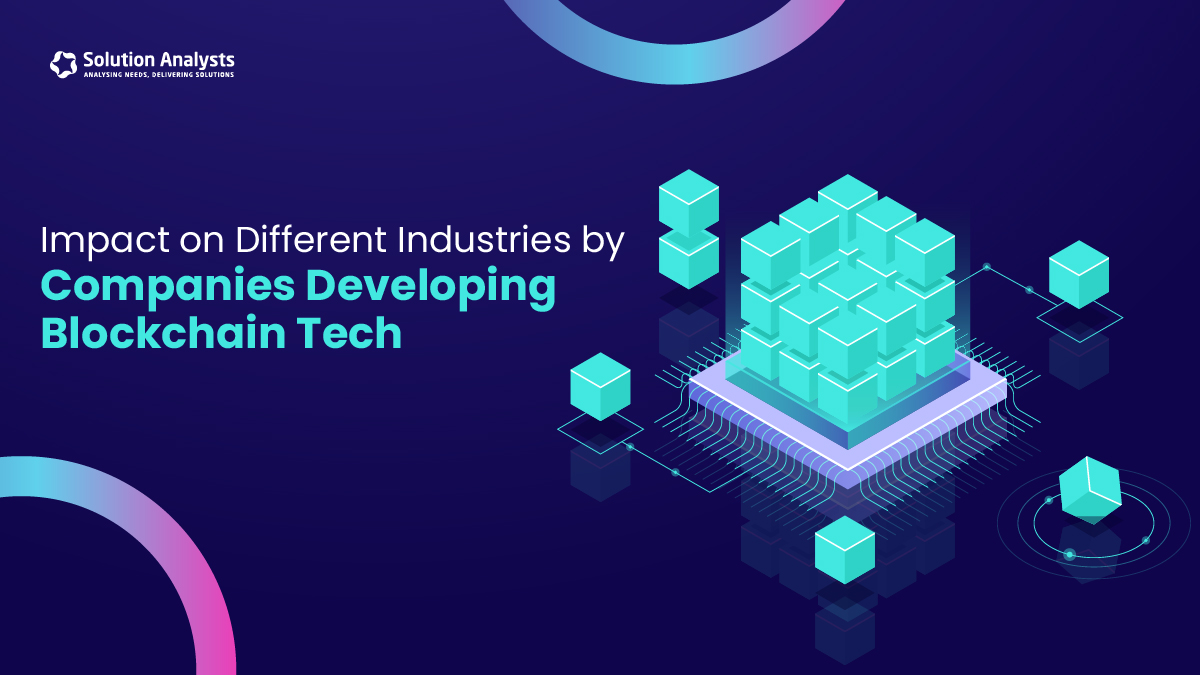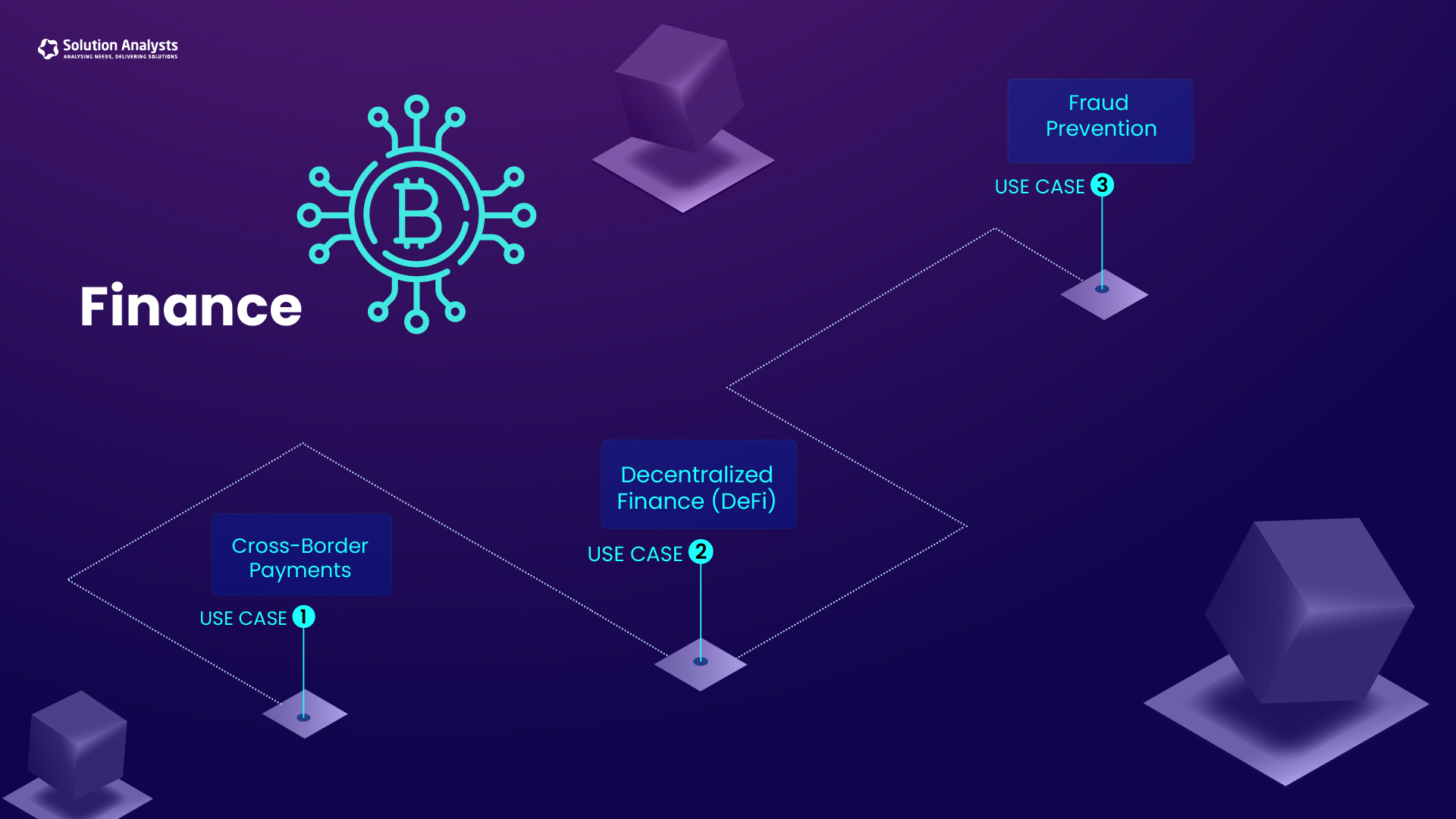
Table of Contents
Blockchain technology revolutionizes various industries, offering decentralized, secure, and transparent solutions to complex challenges. In 2024, there are several companies developing blockchain applications that can lead the charge in blockchain adoption, leveraging its potential to enhance efficiency, security, and trust in their operations. This blog explores the top blockchain industries and highlights key use cases that showcase the transformative power of this technology.

Finance
The finance and banking sector has been one of the earliest adopters of blockchain technology, and it continues to lead the charge in 2024. Companies developing blockchain are focusing on its ability to offer transparent, secure, and decentralized transactions has revolutionized the way financial institutions operate. With the rise of central bank digital currencies (CBDCs) and the increasing adoption of decentralized finance (DeFi) platforms, blockchain is reshaping global financial systems. The ability to execute smart contracts, improve cross-border payments, and enhance anti-fraud measures are just a few examples of how blockchain is transforming this industry.
Use Case 1: Cross-Border Payments
Blockchain is revolutionizing cross-border payments by enabling near-instant transactions with reduced fees. Traditional methods of transferring money internationally are often slow and expensive. Still, companies developing blockchain based solutions, such as Ripple, allow for fast, secure, and cost-effective cross-border payments, enhancing the overall customer experience.
Use Case 2: Decentralized Finance (DeFi)
DeFi platforms leverage blockchain to create decentralized financial services, such as lending, borrowing, and trading, without the need for intermediaries like banks. This democratizes access to financial services and provides users with more control over their assets. Examples include platforms like Aave and Uniswap, which have gained significant traction.
Use Case 3: Fraud Prevention
Blockchain’s immutable ledger makes it an ideal tool for fraud prevention in financial transactions. By recording transactions in a transparent and tamper-proof manner, blockchain helps reduce the risk of fraud, enhancing the security of financial operations. This is particularly beneficial in sectors like insurance and investment management.

Supply Chain Management
Supply chain and logistics have seen significant advancements with the integration of companies developing blockchain technology. In 2024, this industry is expected to further leverage blockchain to improve transparency, traceability, and efficiency across supply chains.
Blockchain enables real-time tracking of goods, ensuring the authenticity of products and reducing the risk of counterfeiting. Moreover, smart contracts streamline operations by automating agreements between suppliers, manufacturers, and distributors. As global trade continues to expand, blockchain will play a critical role in ensuring the integrity and security of supply chain operations.
Use Case 1: Provenance Tracking
Blockchain allows for the tracking of products from their origin to the final consumer, ensuring the authenticity and quality of goods. This is particularly valuable in industries such as food and pharmaceuticals, where knowing the origin and journey of a product is crucial for safety and compliance.
Use Case 2: Smart Contracts for Supplier Agreements
Smart contracts on the companies developing blockchain can automate and enforce supplier agreements, reducing the need for manual intervention and minimizing disputes. This ensures that all parties in the supply chain adhere to agreed terms, leading to more efficient and reliable operations.
Use Case 3: Anti-Counterfeiting Measures
By recording product information on a blockchain, companies can combat counterfeiting by providing consumers with a verifiable history of the product. This is particularly useful in the luxury goods industry, where counterfeit products can significantly damage brand reputation.
Healthcare
The healthcare industry is poised for a blockchain revolution in 2024. With the growing need for secure and interoperable health records many blockchain development companies are offering solutions by enabling decentralized and tamper-proof storage of patient data. This technology enhances data privacy, improves patient outcomes, and facilitates seamless sharing of medical information across healthcare providers.
Additionally, multiple benefits of blockchain for businesses include blockchain being used to combat counterfeit drugs by ensuring the authenticity of pharmaceuticals from production to distribution. As healthcare continues to embrace digital transformation, blockchain will be a cornerstone of innovation.
Use Case 1: Secure Patient Data Management
Blockchain provides a secure and decentralized way to store and manage patient data, ensuring that it remains confidential and tamper-proof. Patients can control who has access to their data, enhancing privacy and security in healthcare.
Use Case 2: Drug Traceability
Blockchain enables the tracking of pharmaceutical products from manufacturing to distribution, ensuring the authenticity of drugs and reducing the risk of counterfeit medications entering the supply chain. This improves patient safety and ensures compliance with regulatory standards.
Use Case 3: Clinical Trials and Research
Blockchain can enhance the transparency and integrity of clinical trials by securely recording and sharing data among researchers. This prevents data manipulation and ensures that trial results are accurate and trustworthy, accelerating the development of new treatments.
Real Estate
Real estate is another industry where blockchain is making significant inroads. In 2024, the adoption of blockchain in real estate transactions is expected to accelerate. Blockchain simplifies the buying and selling process by enabling digital property titles, reducing the need for intermediaries, and ensuring the accuracy of property records.
Smart contracts facilitate automated, transparent, and secure transactions, reducing the time and cost associated with traditional real estate deals. As a result, blockchain is democratizing access to real estate investments and enhancing trust in the property market.
Use Case 1: Property Transactions
Blockchain based application development simplifies the process of buying and selling property by enabling secure and transparent transactions without the need for intermediaries. Smart contracts can automate the execution of property agreements, reducing the time and cost associated with real estate transactions.
Use Case 2: Fractional Ownership
Blockchain allows for the fractional ownership of real estate, enabling investors to purchase shares in properties rather than buying entire properties. This democratizes real estate investment, making it more accessible to a broader range of investors.
Use Case 3: Title Management
Blockchain can securely store property titles, reducing the risk of fraud and ensuring that ownership records are accurate and easily accessible. This increases trust in property transactions and simplifies the process of transferring ownership.
Conclusion
Blockchain technology is at the forefront of innovation across multiple industries, and its impact will continue to grow in 2024. Finance, supply chain, healthcare, real estate, and energy are just a few examples of sectors where blockchain is driving transformative change.
As businesses and governments recognize the potential of blockchain, we can expect to see even more industries exploring its applications, leading to a more decentralized, transparent, and efficient global economy. If you are wondering how to develop a blockchain application or looking to connect with a custom blockchain application development partner, it can help you bring your blockchain concept to life.











 sales@solutionanalysts.com
sales@solutionanalysts.com biz.solutionanalysts
biz.solutionanalysts






